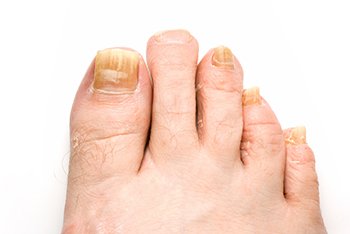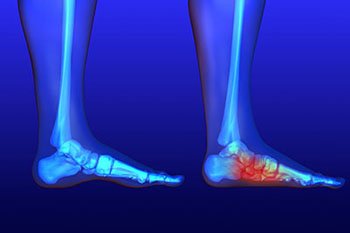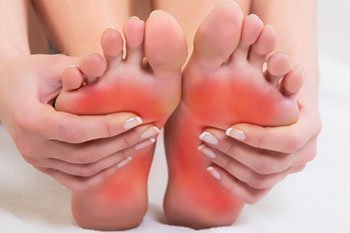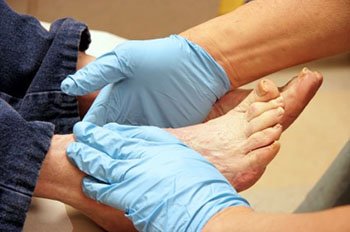
Freehold (732) 294-9393

Freehold (732) 294-9393

Located in Freehold, NJ, podiatrist Dr. Henry J. Miller strives to supply patients with quality treatment and care of the foot, ankle, and lower leg. Dr. Miller has served the Monmouth County area since 1993, providing treatment for a variety of podiatric conditions including bunions, corns, calluses, heel pain, and ingrown toenails. He is certified by the American Board of Foot and Ankle Surgery. Also certified by the Council for Medical Education and Testing (CMET) in wound healing, Dr. Miller specializes in diabetic foot care and wound care. The office’s friendly staff welcomes new patients of all ages, promising to deliver a pleasant office visit. The practice aims to work with patients to ensure that they fully understand their conditions and the treatments that best suit them.
Dr. Henry J. Miller accepts a variety of insurance plans. Call (732) 294-9393 to schedule an appointment today!

Fungal toenails form due to an infection that gets in between either the cracks in the nail or possible cuts on the surrounding skin. When this occurs, it’s likely to discolor and thicken the nail; this makes it hard to care for or trim. The nail itself may also become brittle and could potentially crumble. The fungus under the nail may build over time, separating the nail from the bed and ultimately causing it to fall off if not treated properly.
Fungal nails typically form due to the lack of footwear in public, warm, damp environments. Popular areas where patients have picked up a fungal infection include communal showers, locker rooms, gyms, and swimming pools. If you’re prone to sweaty feet, you may be more likely to develop a fungal nail as well. You may also be more likely to develop a fungal nail if you have a weaker immune system or have a history with athlete’s foot.
For a proper diagnosis and advised treatment plan, it’s recommended that you consult with a podiatrist as soon as possible for professional care and to prevent the infection from spreading.

Those who have a very low foot arch or no arch at all have a condition referred to as flat feet. Most children are born with flat feet and will gradually develop arches in their feet over time. However, if the arch does not develop, it’s likely for one to experience foot pain as they grow older. Those with flat feet tend to walk with an overpronation, often causing the feet to point outward. Since the feet carry the weight of the body, it can put an immense amount of pressure on those with little to no arch because that extra support is absent. The weight of the body is often unevenly distributed as well.
People with flat feet may feel foot pain due to a straining of their muscles and connecting ligaments. It’s also common for people with flat feet to roll their feet as they walk, which may in turn cause discomfort for the ankle. Swelling of the calf, lower legs, knees, and lower back may form as a result of flat feet, along with the feeling of stiffness in the feet as well. Some of the most common reasons for the development of flat feet include genetic factors, a foot or ankle injury, arthritis, and damage to the nervous system. Specific exercises and foot stretches may help alleviate the discomfort that flat feet can often cause.
If you would like more information about caring for flat feet, we suggest that you speak with a podiatrist who can offer you professional recommendations and an advised treatment plan.

Foot pain can come in various forms and for a number of different reasons. When discomfort is experienced, it’s extremely important that you visit with a podiatrist who can properly diagnose the reason for the pain. Common causes of foot pain may include overuse injuries, such as from sporting activities like running. Other causes include complications due to arthritis, as well as diabetes. There are a number of foot conditions that can lead to foot pain as well.
Many patients have experienced severe foot discomfort due to bunions, plantar warts, hammertoes, stress fractures, blisters, ingrown toenails, and corns and calluses, to name a few. Foot pain is often associated with the following symptoms: swelling, redness, warmth, tenderness, discoloration, stiffness, as well as burning, tingling, and numbing sensations. It may help to check the feet daily for any abnormalities or deformities that may be causing the foot pain. Treatment for foot pain will vary on a case by case basis, along with the recovery process.
If you’re experiencing foot pain, we recommend you consult with a podiatrist for a proper diagnosis and advised treatment plan.

Diabetes can unfortunately cause many foot problems that often lead to a great deal of pain and discomfort. For example, poor circulation of the feet is often an issue among those with diabetes because it damages the nerves. When this occurs, it’s likely for one to develop peripheral neuropathy. Peripheral neuropathy can make it feel like you have pins and needles in your feet. Others who have experienced this condition have also recalled a burning, tingling, or numbing sensation.
Since nerves are often damaged due to diabetes, the issue of not feeling when a wound has developed can lead to serious complications. Minor cuts or scrapes on the foot may run the risk of getting infected if the feet are not checked daily for wounds. Diabetes may also reduce blood flow to the feet, which in turn can make it harder for wounds to heal. With that being said, it’s important you seek professional help for treating any foot ailments. To prevent yourself from running the risk of developing a serious foot condition, it’s recommended that you wash and dry your feet daily, cut your toenails carefully, keep your feet moisturized, check them regularly for any abnormalities, and keep your feet warm and dry.
For more advice on how to care for diabetic feet, we suggest you consult with a podiatrist for professional care and a recommended treatment plan for any existing conditions.
1000 West Main Street
Freehold, NJ 07728
(732) 294-9393
| Mon: | 9:00 am - 12:00 pm |
| Tues: | 2:00 pm - 6:00 pm |
| Wed: | 9:00 am - 12:00 pm |
| Thur: | 2:00 pm - 6:00 pm |
| Fri: | 9:00 am - 12:00 pm |
| Sat: | By Appointment Only |